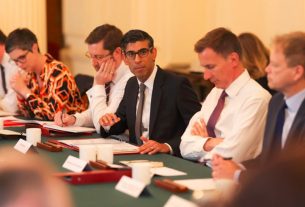Liz Truss’s mate, Dr Thérèse Coffey is the new cigar chomping, whisky swilling, real ale loving secretary of state for health and social care. Like many a doctor (medical and philosophical) – and many a politician too – the health secretary seems to be very much a “do as I say, not as I do” kind of person.
Yet this is Truss’s secretary of state for health and social care – the person in charge of public health, promoting healthy lifestyles, spearheading public health campaigns, deciding and implementing public health policy.
While almost any minister could easily be the personification of everything Truss’s (unelected) government portends to be, Coffey really stands out as an exemplar.
Dr Thérèse ‘Karoke’ Coffey PhD
Though the health secretary likes to be called a doctor, especially when being referred to in the House of Commons, Thérèse Coffey isn’t actually a “real” (ie. medical) doctor. Instead she holds a PhD in chemistry.
A real medical doctor would likely be concerned about the health secretary’s smoking and drinking habits, as too her ruddy complexion and swollen frame that could be signs of someone with a range of underlying conditions.
As a member of CAMRA – the campaign for Real Ale – Coffey probably frequents a fair few old-style pubs and might even enjoy some of the bar snacks available in such establishments. Like peanuts and crisps, pork-scratchings and pickled eggs. With a cheroot to follow.
Or, Coffey may have a sweet tooth. A result, perhaps from her pre-politics employment with Mars. But the doctor of chemistry didn’t work for the confectionary and soft-drinks giant as a scientist. Instead Coffey rose to become Mars Drinks UK’s finance director, having qualified as a chartered management accountant, which is quite the career shift given the chemist was also a finance manager at the BBC. Now she is an MP and the secretary of state for health.
Which means political observers will no doubt be paying close attention to what Coffey does, not least regarding the sugar tax.
Dentists and health professionals certainly are. More so following reports the sugar tax (aka the Soft Drinks Industry Levy) – which raises £300 million a year and has cut sugar in some soft drinks by 30% since its introduction in 2018 – will also be tossed onto the Truss government’s bonfire of regulations and taxes.
The sugar tax has proved to be one of the most effective weapons in the battle against childhood obesity. Yet Truss’s reboot-5.0-Tory-government looks set to neutralise it by ditching it.
The doctors who treat obesity and diabetes are as aghast by the multiple reports signalling the tax will be reversed as the dentists dealing with tooth decay. Heart surgeons warn the medium and long term consequences will prove even more disastrous for a country inextricably inching its way towards a coronary. Intervention is needed, virtually everyone agrees. Unfortunately for Britain, PM Truss and her health secretary Coffey are among those who don’t.
Cost of obesity
Nearly two-in-every-three adult Brits are obese. One-in-four of England’s 10-11 year-olds are obese. And perhaps most worryingly of all, more than one-in-seven four-to-five year-old kids are too.
Obesity already costs the NHS more than £6 billion every year. By 2050 it will be nearer £10 billion. Back in 2017 the government stated “the overall cost of obesity to wider society is estimated at £27 billion.” Even further back in 2014, McKinsey Global Institute said obesity was costing the UK £47 billion every year in lost economic activity.
Beyond money, the human cost of obesity is even greater. It’s immeasurable for the individual, their family, friends and wider community.
Obesity levels are increasing. The trend is upward. Even with the sugar tax.
Dr Thérèse Coffey PdD’s links with Mars Drinks
Detractors of the levy say obesity’s upward trend proves the sugar tax is ineffective. It also stymies industry, creativity and the British economy too.
But supporters of the tax point out that there is no single silver bullet that will magically fix the obesity crisis. It is a complex problem requiring sophisticated – social and economic – measures working together.
It’s why the experts – the health professionals, doctors, pharmacists, dentists and almost everyone else –agree that scrapping the sugar tax would only make the UK’s obesity timebomb even more destructive to the country.
There is, of course, no suggestion that Dr Thérèse Coffey PdD’s links with Mars Drinks will have any bearing on government policy or its fiscal U-turns. In the same way that Truss’s previous employment as an accountant for Shell had no influence on her decision not to introduce a windfall tax on energy companies’ profits.
The same companies, remember, are set to make excessive profits of £170 billion this year. It’s the same companies who Truss has decided to give £150 billion of taxpayer money (ie. borrowed) in order to cap (average household) energy bills at £2,500 for the next two years.
The details of the plan – (worth repeating) for taxpayers to pay £150 billion to energy companies (on top of the £170 billion excessive profits they will make this year) will be announced by Kwasi Kwarteng, the latest chancellor of the exchequer in Friday’s (October 23) mini-budget. Kwarteng will also announce sweeping tax cuts worth £30 billion – despite the fears almost universally expressed by economists, about the inflationary consequences of such fiscal measures. The Bank of England raised interest rates again on Thursday by 0.5% to 2.25% and announced the UK economy is probably already in recession.
Kwarteng’s obvious disregard for the opinion of experts can be traced back to Michael Gove’s infamous remarks during the EU referendum. All the evidence suggests Dr Thérèse ‘Karoke’ Coffey PhD concurs. So don’t be surprised when the sugar tax is scrapped and the UK’s health secretary lights up a big stogie and drains a dram to celebrate.




